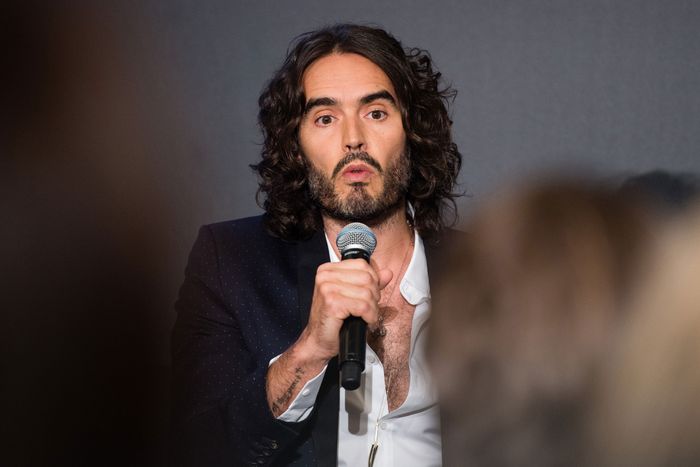
On September 16, U.K. outlets the Sunday Times, the Times of London, and Channel 4’s Dispatches published an exposé detailing rape and sexual-assault allegations against comedian turned conspiracy theorist Russell Brand. Four women came forward with accusations against Brand in the outlets’ bombshell investigation, with alleged incidents taking place between 2006 and 2013. One of the accusers alleged that Brand raped her in June 2012 at his Los Angeles home. Another accuser said Brand sexually assaulted her as they were working together in L.A. in early 2013. One woman alleged that Brand sexually assaulted her in 2006 when she was 16 and he was 31 in London. A fourth accuser claimed that Brand sexually assaulted and committed physical and emotional abuse against her, the joint report said.
Brand has vehemently denied the allegations, saying, “What I seriously refute are these very, very serious criminal allegations. Also it’s worth mentioning that there are witnesses whose evidence directly contradicts the narrative that these two mainstream media outlets are trying to construct apparently in what seems to me to be a coordinated attack.” (An attorney who has represented Brand did not immediately respond to a request for comment.)
After the allegations were published, multiple companies dropped Brand. One day after the investigation ran, Tavistock Wood Management Agency announced that it had “terminated all professional ties to Brand,” and Bluebird, his book publisher, said it would “pause all future publishing with Russell Brand,” the Bookseller said. YouTube demonetized Brand’s conspiracy-theory-fueled channel. The BBC has also removed some Brand content from its radio and television streaming services, Variety said. While Brand has seen fallout from the allegations, could he actually be charged over the sexual-assault allegations, some dating back as far as 20 years and spanning two countries? Can prosecutors still potentially pursue a case in relation to these allegations? What else do they need to act on the case? These questions are especially prescient in the wake of the Me Too movement, which saw authorities taking decades-old allegations seriously and resulted in the rape convictions of Harvey Weinstein and Danny Masterson, for example.
Vulture spoke with several veteran attorneys to see how police and prosecutors might weigh the allegations against Brand in determining whether to bring a case.
Can Russell Brand be prosecuted in California?
Yes, due to the 2016 elimination of the statute of limitations on most sex crimes in California’s legal system. “The statute of limitations for reporting to the police and for the police and DA to investigate sexual crimes, including rape, has been lifted so that survivors of sexual assault can report the crimes many years after they actually happened,” said Rachel Fiset, co-founder of Los Angeles–based Zweiback, Fiset & Zalduendo LLP. “It’s indefinite and it may be brought at any time after the event occurs for rape.” (Previously, the statute of limitations for rape was ten years, with a few exceptions. For minor victims, the statute of limitations was expanded to their 40th birthday, per reports.)
The elimination of the statute of limitations for most sex crimes applies to incidents that occurred after January 1, 2017. However, there’s also a window for crimes that happened before that date that, so long as they would have fallen within the statute of limitations before January 1 2017 . The women’s allegations against Brand in Los Angeles fall into this timeline. Asked for comment on whether accusers had come forward or whether there was an investigation, the Los Angeles Police Department said in an email, “We do not have an investigation.”
How would an investigation into allegations from more than ten years ago unfold?
In California, an investigation like this would typically start after one of his accusers went to police. “You get a full story, you get all of the witnesses, you get all of the details as to where they were, who she told, what therapy she sought, what medical records she would have, that would corroborate her allegations. You’re really doing a really thorough intake,” Fiset explained of the process. Police would then investigate “to the point where they believe they would have probable cause to arrest.” If police thought there was a strong case, they would — especially in a high-profile case — discuss it with a high-ranking prosecutor. “A case has not been presented to the office,” the Los Angeles District Attorney’s Office said.
What would convince prosecutors to act on a case?
Neama Rahmani, a former federal prosecutor who founded West Coast Trial lawyers, said prosecutors are risk-averse, especially in cases involving sexual or domestic violence. “Prosecutors don’t like to lose,” Rahmani said. Rape, sexual assault, sexual abuse, and domestic violence are the most underreported crimes, but prosecutors worry about the possibility of false reporting, even though it’s incredibly rare. “What you want, if you’re a prosecutor, is hopefully to have a contemporaneous report — ideally, to a doctor or police officer … or at least to friends. You don’t want allegations that this was fabricated after the fact.” Prosecutors will want to assess whether an accuser’s allegations have been consistent over time. “In most cases, they look for a likable and credible victim,” Rahmani said. “If you’ve got multiple victims, [that] makes it a lot easier, but if it’s one, it can be challenging to get the prosecution.”
Reporters who conducted the exposé “interviewed hundreds of sources who knew or worked with Brand” over the years. The woman who alleges Brand raped her in Los Angeles “was treated at a rape crisis centre on the same day, according to medical records,” the exposé said. The journalists also reviewed alleged text exchanges hours after she left his house. “When a girl say[s] NO it means no,” she said in one alleged text. Brand purportedly responded by claiming he was “very sorry.” Tre Lovell, a Los Angeles entertainment attorney, said there are challenges for prosecutors and civil lawyers to explain why allegations are surfacing years later. “They’ve got to get by the first question that everybody asks: Why didn’t you bring it back then? Why were you waiting? They have to have a good reason for that, because people, I think, are skeptical.”
Has an investigation started in the U.K.?
When asked if any more women had come forward following the investigation, the Metropolitan Police replied, “We are aware of reporting by the Sunday Times and Channel 4’s Dispatches about allegations of sexual offences.” In a September 17 statement, the police said that the force “received a report of a sexual assault which was alleged to have taken place in Soho in central London in 2003. Officers are in contact with the woman and will be providing her with support.” The office also added that it “encourages anyone who believes they may have been a victim of a sexual offence, no matter how long ago it was, to contact us.”
Could Brand possibly be prosecuted in England for allegations dating back to 2006?
Yes. Alan Collins, a lawyer and partner at Hugh James in London, said that under criminal law in England, there is “no statute of limitations when it comes to sexual offenses.” With civil law, there is an act that has a three-year limitation period. For children, the three-year period starts on their 18th birthday. Courts can waive the limitation “if it is fair to do so,” Collins said. In sexual-abuse cases, “judges tend to be disposed to disapply provided a fair trial is possible, and that means the evidence has not withered over time.”


